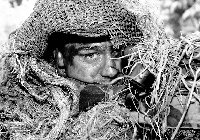Lessons of Kosovo

Although the Serbian agreement to withdraw seems to have come unglued, this is historic. International moral standards of conduct, long derided by geopoliticians, now have muscle.
We will not always be able to do the right thing everywhere. But we have set a precedent of doing the right thing somewhere, and once the right thing becomes possible, it tends to become probable.
What are the lessons the West is learning in trying to stop national criminality?
1. Never tell the criminals what you will not do. This is a sign of lack of confidence in your own people and your allies, and it diminishes your ability to lead. "I do not intend to send ground troops" encourages the criminals and prolongs the war. Only when NATO ground forces became a live option, and when KLA guerrilla forces made a foray that flushed out Serbian tanks and made them targets for air destruction, did the criminals begin to talk. Our troop buildup must now begin apace.
2. When you decide to strike, strike decisively. As Napoleon told his hesitant generals, "If you are going to take Vienna, take Vienna." We should have turned out the lights in Belgrade and destroyed telecommunications the first day. Slow, steady escalation invites propaganda exploitation of "collateral damage," highlights mistakes like the Chinese Embassy destruction and in the long run costs lives.
3. Do not place a higher value on the lives of warriors than on the lives of civilians.
Members of armed forces are trained and paid to risk their lives; civilians are not. By bombing from 15,000 feet, we avoid NATO casualties, but have failed for over two months to stop the murder, rape, pillage, and mass deportation that was a mission of our military intervention.
4. Do not overestimate the courage of an army and paramilitary that kills the unarmed. Just as the vaunted Iraqi Army, adept at gassing civilians, cracked and ran at the first sight of firepower, many Serbs who destroyed villages in Kosovo are apparently unwilling to die for Milosevic. Those who commit atrocities are rarely brave professional soldiers and should not intimidate well-armed rescuers.
5. Remember that in any alliance, some allies will be more allied than others. Britain emerged as NATO's leader and France was stalwart. The United States is providing the air punch but temporized on a ground threat and unwisely insisted on a Russian intermediary. Germany, Italy, and Greece are the weak sisters. Consensus should be sought, but no member of NATO should be able to veto the great majority's decision.
6. Do not let mistrust of the leadership's competence becloud faith in the rightness of a cause. Principled isolationists and pacifists of right and left are having their say, but most opposition to our Kosovo intervention comes from Republicans who feel Clinton blew too uncertain a trumpet and would settle for a weak compromise. McCain, Bush, and Dole put backbone in Clinton policy while others fail to help.
7. Do not let the loser win. Until sensible Serbs decide to hand the Milosevic gang over to the Hague tribunal, no bridge should be rebuilt or embargo lifted. Allow no subversion of Montenegro and lock in autonomy for Hungarian Vojvodina. When withdrawal finally commences, the Kosovo Occupying Force must be commanded and controlled by NATO, not India or Sweden, and the European nation with the largest army - Turkey - should have a big presence.
8. Don't try to mix oil and water in patrolling the peace. The returning KLA will be "demilitarized" (no tanks) but not disarmed; it will be seeking vengeance. The burden on peacekeepers will be to protect minority Serbs and to uphold a pretense of their sovereignty. Better to offer individual Serbs in Kosovo a relocation bonus to safety and to let Kosovo's victims have their independence.
The NATO-Serbian war is not yet over, but civilization is more civilized for having intervened to do the right thing. Next time we are more likely to do it the right way.
The New York Times, June 7, 1999
Newspaper output №:
№22, (1999)Section
Day After Day





